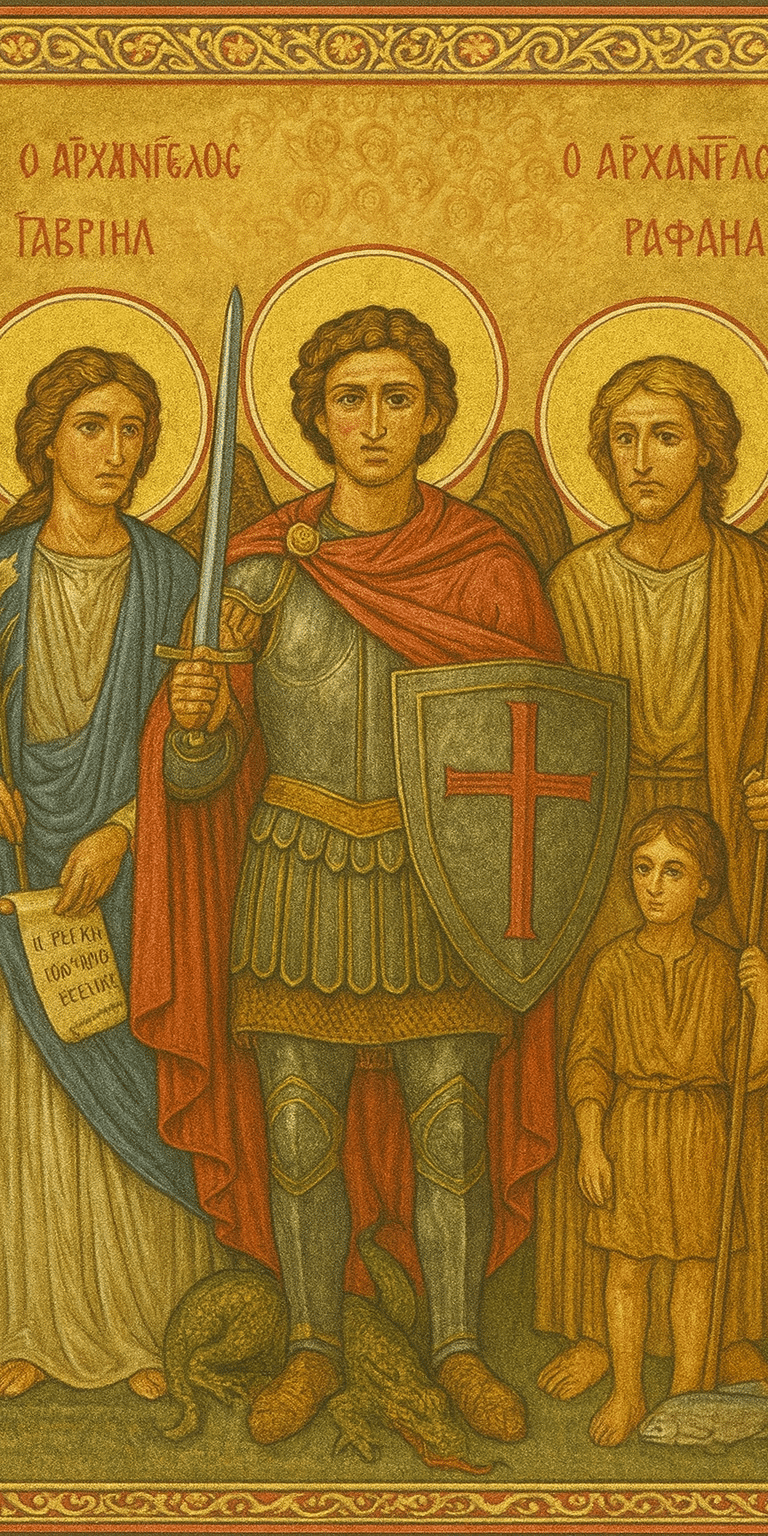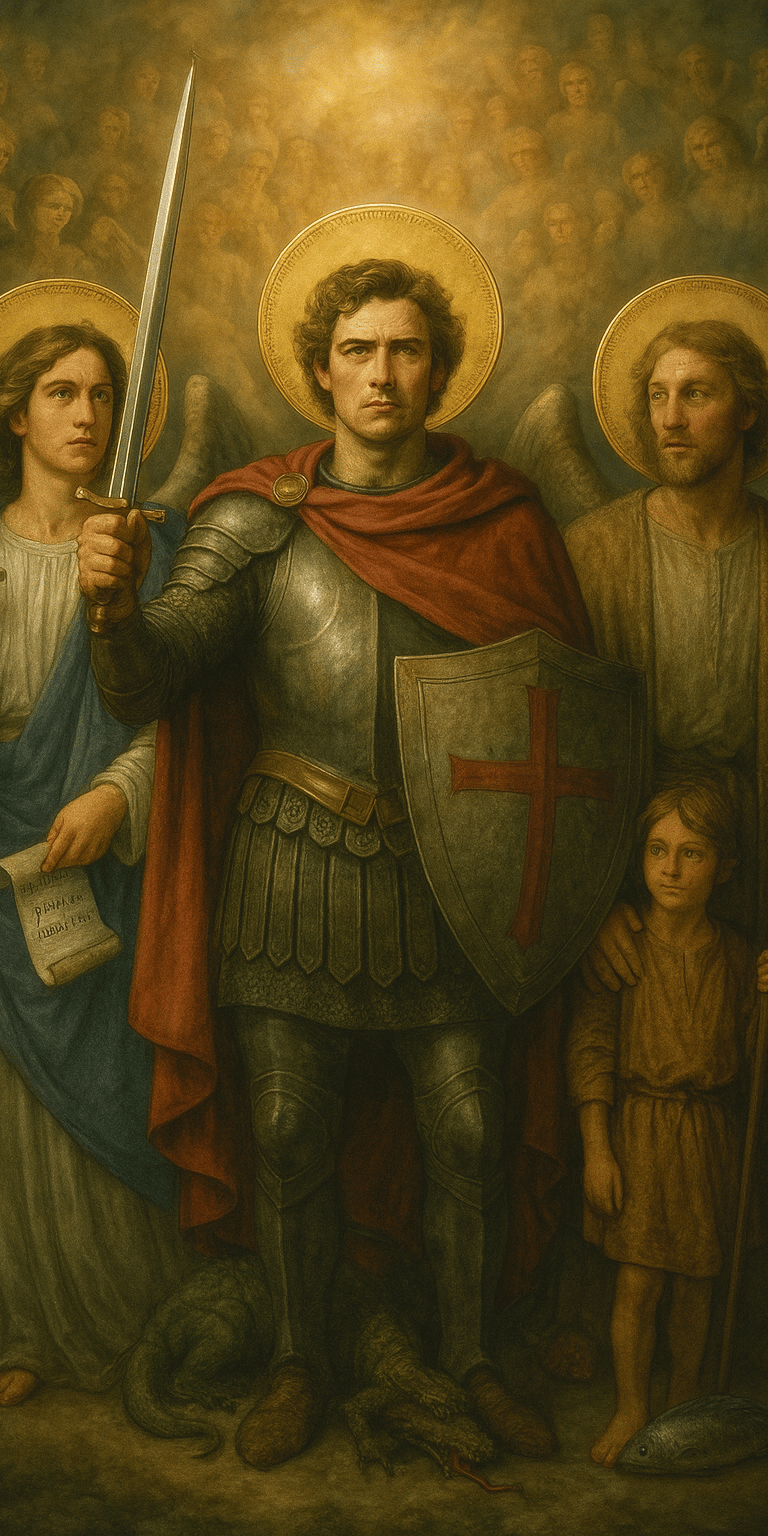Saint Michael, Saint Gabriel, and Saint Raphael – The Three Archangels
Feast Day: September 29 | Patronage: St. Michael – protection & soldiers | St. Gabriel – messengers & communication | St. Raphael – healing, travelers, and the blind
Halo & Light Studios
9/29/20254 min read


Click Link for a reel of Daily Dose of Saints and Faithful Art:
https://youtube.com/shorts/jzDqRJT6Azc?feature=share
Fellow Pilgrims in Christ,
From the dawn of creation, angels have stood as radiant servants of God, carrying out His will and guarding His people. Scripture tells us they are “ministering spirits sent forth to serve, for the sake of those who are to obtain salvation” (Hebrews 1:14). Far from the sentimental images that often fill popular imagination, the angels of the Bible are mighty, intelligent, and wholly devoted to God’s glory. They are neither ghosts nor departed human souls, but a separate creation entirely—pure spirits, without bodies, yet more real than the visible world because they stand face to face with God.
Catholic tradition, drawing from both Scripture and the insights of the Fathers of the Church, teaches that angels are ordered into nine choirs, grouped into three hierarchies. This vision, shaped by St. Dionysius the Areopagite and later reflected upon by St. Thomas Aquinas, emphasizes both order and mission in the heavenly host.
First Hierarchy (closest to God): Seraphim, Cherubim, and Thrones. Their whole existence is wrapped in contemplation of the Most Holy Trinity. Seraphim are described as “burning ones,” consumed with love for God (Isaiah 6). Cherubim are guardians of divine mysteries, often depicted at the gates of Eden (Genesis 3:24). Thrones, mysterious in Scripture, are described by tradition as bearing God’s authority and justice.
Second Hierarchy: Dominions, Virtues, and Powers. These govern the order of the cosmos. The Dominions are like angelic governors, ensuring all lower angels carry out God’s will. Virtues are associated with the working of miracles and strengthening creation. Powers protect the world from demonic influence and disorder.
Third Hierarchy (closest to humanity): Principalities, Archangels, and Angels. Principalities watch over nations and leaders, guiding the destinies of peoples. Archangels are entrusted with great missions of salvation history, standing between heaven and earth as God’s messengers. Finally, the lowest choir, simply called Angels, are closest to us. From this group come the Guardian Angels who watch over each soul.
This celestial hierarchy reminds us that heaven is not chaos but divine order—every being, from the greatest seraph to the humblest guardian angel, lives for the glory of God and the salvation of souls.
Among all the angelic hosts, only three archangels are named in Sacred Scripture. Their names themselves reveal their mission, for in Hebrew, el means “God.” Each name is not only a title but a testimony to God’s action in salvation history.
St. Michael the Archangel – Defender of the Church. His name means “Who is like God?”—a rhetorical question that proclaims God’s sovereignty over every creature. Michael is described in the Book of Revelation as the leader of the heavenly armies who cast down Satan and his rebellious angels (Revelation 12:7–9). From the earliest centuries, Christians have invoked him for protection in times of spiritual warfare. Pope Leo XIII even composed the well-known Prayer to St. Michael after a vision of demonic assaults on the Church. Today, he remains the Church’s mighty protector against the snares of the enemy.
St. Gabriel the Archangel – Messenger of salvation. Gabriel’s name means “Strength of God.” He appears in the Book of Daniel, interpreting visions of the future Messiah, and in the Gospel of Luke as the herald of two miraculous births: first to Zechariah, announcing the birth of John the Baptist, and then to Mary at the Annunciation. His greeting, “Hail, full of grace,” ushered in the greatest mystery of faith—the Incarnation of the Son of God. Gabriel reminds us that God’s Word always brings strength, even when His message requires faith and courage.
St. Raphael the Archangel – Healer and guide. Raphael’s name means “God heals.” In the Book of Tobit, he disguises himself as a traveler and journeys with Tobias, protecting him from harm, helping him find a faithful spouse, and restoring the sight of his father. Raphael shows us God’s intimate care, healing not only bodies but guiding hearts. He is patron of travelers, doctors, and the blind—reminding us that God’s providence often comes through hidden companions.
Modern society, with its materialistic lens, often dismisses angels as myth or sentimental imagery. Yet the Church insists they are real, powerful, and active. They remind us that creation is more than what meets the eye. When we gather for Mass, we are not alone: angels surround the altar, adoring the Lamb who takes away the sins of the world. Every time we sing the Sanctus—“Holy, Holy, Holy, Lord God of Hosts”—we join the song of the seraphim in heaven.
Even more personally, each believer is entrusted with a guardian angel. This truth, often overlooked, is one of the most consoling in the faith: God, in His providence, assigns to each soul a heavenly protector who watches, warns, and intercedes. The saints often testified to the closeness of their angels. St. Padre Pio even encouraged people to send their guardian angel to deliver messages!
The archangels remind us that God is never distant. In Michael we see His strength against evil, in Gabriel His Word that gives life, and in Raphael His healing love. Their feast day, September 29, invites us to recognize the reality of spiritual warfare, the joy of God’s saving message, and the tenderness of His providential care.
As we honor the archangels and all angelic choirs, we take courage: heaven is not silent. God sends His messengers, protectors, and healers to guide us on the path of salvation. Let us pray with confidence:
St. Michael, defend us in battle.
St. Gabriel, bring us God’s message with clarity.
St. Raphael, heal and guide us in our weakness.
In your company, may we one day join the eternal song of heaven: “Holy, holy, holy is the Lord God of hosts!”


